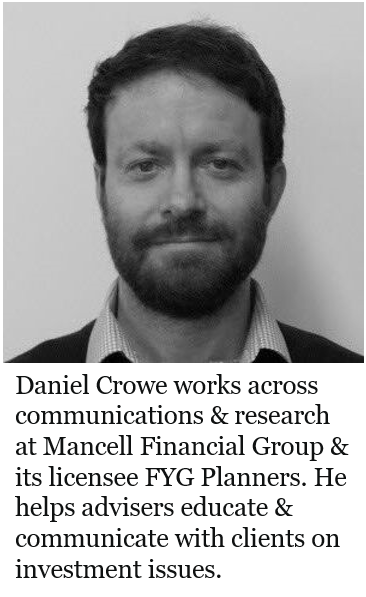
The market’s going to crash.
I’m waiting for the next crash.
Crash. Crash. Crash. Crash.
For advisers engaging with new clients right now, it may mean listening to suppositions about the market taking another dive. It’s been reported to me several times.
Some advisers had clients waiting for ‘the next big one’ for years after 2009. Eventually those clients started complaining about their returns, or lack thereof. If there’s one cycle that’s sure to repeat, it’s this one.
Given this is apparently the worst possible time to invest, that’s exactly what I’m going to do. Rigorously.
For 120 straight months I will be contributing to three indices, split three equal ways. You might term it the 33 portfolio. The last 1% likely won’t buy enough units each month so will be stuck in cash. No I’m not mentioning the fund provider.
MSCI World ex-Australia (with net dividends reinvested), in Australian dollars Index.
MSCI World ex-Australia Small Cap Index (with net dividends reinvested) in Australian dollars.
Bloomberg Barclays Global Aggregate Float-Adjusted and Scaled Index hedged into Australian dollars.
Why?
I’ve spent over a decade working with financial advisers. It’s always goals, plans, portfolios. If you don’t have a goal, then you can’t have a plan and you sure as heck can’t portfolio that meets your needs. And of course having an investment philosophy. As David Booth says, “the most important thing about investment philosophy is that you have one.”
That might be the simple part. Because after all that comes discipline.
Discipline to save the money.
Discipline to invest the money.
Discipline to stick with the principles you’ve identified.
With all three, an investor should almost be unbeatable.
Inevitably, many of us drift. There are many elements with the potential to sow discord in our mind, but never provide any solution. Friends, relatives, media, social media, etc etc. After we’ve wasted our time and money on them, we realise it would have been more prudent to stay the course.
So I’m investing now, and I will religiously invest every month for the next ten years. I’m convinced this simple action will put me ahead of 98% of, market timers, second guessers and stock pickers.
I will provide updates every month.
Questions?
You’re an advocate of advice, why aren’t you using an adviser?
I have simple affairs and as noted it’s a ‘project’, along with hopefully being an example. If at some point during the process I need an adviser, I will certainly engage one.
Should I use your 33 portfolio?
Absolutely not! We don’t have the same goals or needs, and you should see a financial professional to determine your portfolio – not some buffoon with a website or guy commenting on a forum.
Why aren’t you investing in Australia?
It’s a big world and I want to be globally diversified.
Why aren’t you hedging?
Over the long term hedging will be unlikely to materially affect my returns. And it’s just another element that may lead me to second guess my actions.
Why 33% in small caps?
Small caps are known to outperform large over the longer term. I’m tilting equity part of the portfolio that way to hopefully take advantage.
Why 33% in bonds, there’s unlikely to be much of a return from them?
I’m happy to believe there’s still a place for bonds in a portfolio. When the equities inevitably fall, I’d like to believe the bonds stand up and minimise volatility.
Why won’t you mention the managed funds or ETFs?
I’m not here to promote anyone, nor encourage a bias to specific funds.
In the end, this is more about repetitive behaviour than anything else. It’s about not buying into the next crash narrative or sitting on the sidelines when nothing might happen. It’s about investing money when I have it. If it can be a lesson to everyone on how to stick with their own investment process and their own portfolio, all the better.
Time to get on with it.
Disclaimer: The discipline project is a personal endeavour and should not be constituted as a financial strategy that anyone should follow. It is more a study in repetition and shutting out the noise in pursuing a financial goal, than any focus on portfolio construction. Anyone looking to build a portfolio should seek financial advice to find out which strategy is right for them, if you are seeking financial advice then you should consider one of Australia’s best financial advisors who may be able to help you identify your goals and put in place a reliable strategy to pursue them.


